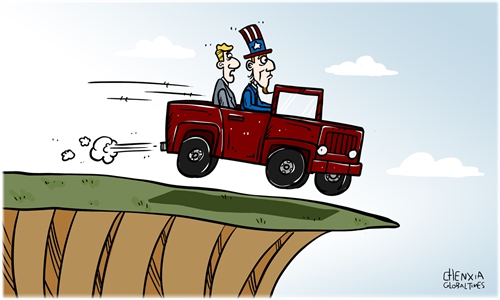
Newport Wafer Fab (NWF) In this photo illustration, Newport Wafer Fab (NWF) logo is seen on a smartphone screen. Photo: VCG
When I was a teenager, the headmaster at my school was a man whose grandparents had arrived in the UK from Germany and set up in business as pork butchers, quickly becoming a trusted and valued part of the local community.However, when war broke out between the UK and Germany in 1914, it was as if they were never part of that community. Riots broke out and pork butchers across the UK - by virtue of their having been German - were targeted for attacks: their shops smashed and businesses ruined.
More than a century later, it seems that the ugly head of race hate is happening again - but this time to the Chinese. There may not be the riots or the visceral hatred that was demonstrated in the early years of the 20th century towards Germans, but there seems to be a clear anti-Chinese vibe at least among a significant portion of UK politicians. And one could be forgiven for thinking they are doing this either out of ignorance or prejudice. But it manifests itself as an irrational hatred towards a people simply by virtue of their being part of a particular race. This time, sadly, it seems to be because they are Chinese.
In the UK, government ministers are currently coming under pressure to reverse a multi-million pound agreement for the sale of a large UK semiconductor factory in Wales to a Dutch company. The problem - as the politicians pressuring the government see it - is that the Dutch company is 100 percent owned by a Chinese company. And it is the Chinese company with which they have a problem.
Members of the UK Parliament have written to the government to demand that a security review be published, on the grounds that they are concerned that the sale has the potential to compromise the UK's national security. Now, this seems very reasonable - were it not for the fact that UK security officials have already explicitly stated that the sale would not compromise the UK's national security. This is partly due to the fact that the company's technology is several generations behind the most advance state-of-the-art chips currently in use. It's a bit like worrying that someone is going to damage the image of Rolls-Royce cars because they want to buy a scrap metal business.
Last year, the UK Prime Minister Boris Johnson instructed his national security adviser Stephen Lovegrove to investigate the proposed 63 million-pound ($82.5 million) buyout of Newport Wafer Fab by the Dutch firm Nexperia, which is owned by Chinese firm Wingtech and which, according to UK media tabloid reports, has links to the Communist Party of China. It is these rumored links which probably lie at the root of political opposition to the sale.
Just a week ago, it emerged that Lovegrove had investigated the deal and concluded that it presented no threat to the UK's national security. But the Foreign Affairs Committee of the UK Parliament this week announced it was not satisfied with Lovegrove's conclusions. It even suggested that he had not even bothered to look into the issue. Now, the committee is calling upon the minister with responsibility for business affairs, Kwasi Kwarteng, to intervene and prevent the deal going through. Because of this pressure, he is reported to be considering using new powers under the UK's new National Security and Investment Act, which lets ministers review buyouts of strategic companies even after they have gone through.
The problem is that, while there is an argument that a sale to an overseas owner could affect the UK's manufacturing industry, it would not pose a threat to national security. The chips manufactured at Newport Wafer Fab are not exactly cutting edge, even though the company is the UK's biggest producer of microchips, which is an essential part of all electronic devices such as smartphones and cars.
Tom Tugendhat, chairman of the Foreign Affairs Committee of the UK Parliament, said: "Semiconductors are essential to every aspect of modern life and Newport Wafer Fab is one of the country's leading manufacturers."
Former UK Conservative Party leader Iain Duncan Smith weighed into the argument by saying: "It beggars belief that the Government is going to stand idly by whilst Nexperia, a Chinese-controlled company, attempts to take over Britain's largest microchip factory."
A UK government spokesman said: "The Government is considering the case and no decisions have been made."
If the deal does not go through, it will not be because of anything Newport Wafer Fab has said. It clearly wants the sale to proceed because it believes that is in the best interests of the company. It is anti-Chinese politicians in the UK who do not want it to proceed.
There is a potential rival for the takeover, led by a consortium of largely UK companies headed by a businessman who left his previous senior management role in a technology company after it was taken over by a Chinese firm.
At times, it seems that the political atmosphere in the UK is toxic towards Chinese companies simply because they are Chinese: there are elements in the establishment in the UK - and in other countries - which assume that to be Chinese is to be bad. The UK is increasingly a poor bet when it comes to treating Chinese companies fairly. Its backtracking over Chinese involvement in nuclear power stations and its exclusion of Huawei from the UK's 5G network are well known. Add to this the fact that the UK's new deal with the US to drop the 25 percent tariff on UK steel exports to the US does not apply if the steel comes from a supplier that happens to be owned by a Chinese company (as is British Steel).
There has even been criticism of a Chinese university donating money to a British university to enable a study of China's foreign policy strategy. It is a relatively tiny 20,000 pounds to Jesus College, Cambridge, from Beijing's Tsinghua University. Again, Iain Duncan Smith, the former UK Conservative Party leader, said: "The very fact that Jesus College and other universities are so dependent on Chinese money should be a matter of national shame."
It is difficult to rationalize all expressions of these anti-China sentiments. It is almost as if we have gone back a century in time to disparage a group of foreigners - although this time it seems to be Chinese and not Germans.
The author is a journalist and lecturer living in the UK. bizopinion@globaltimes.com.cn

